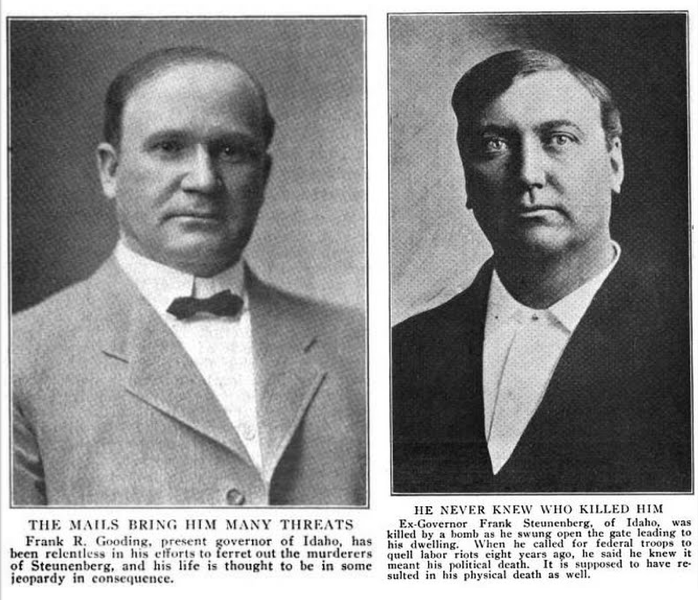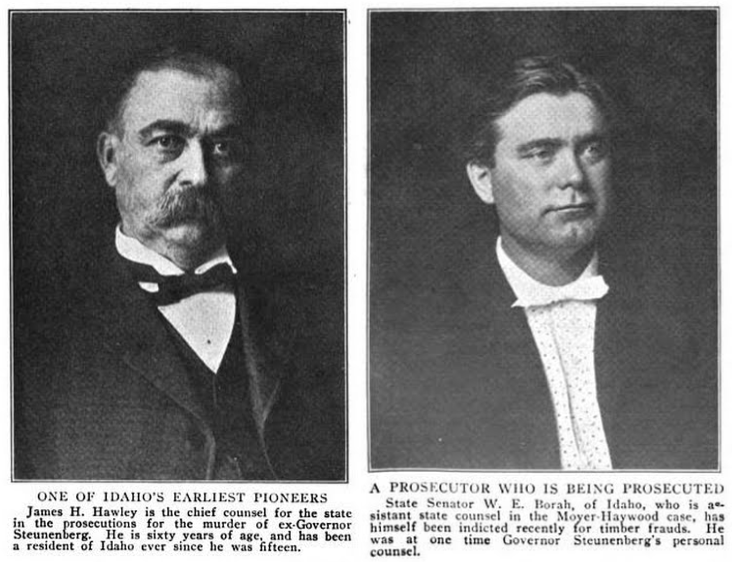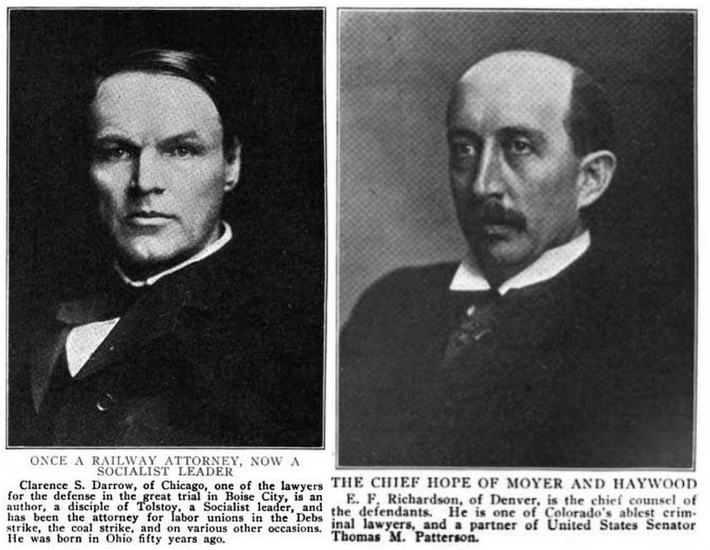If they hang Moyer and Haywood,
they’ve got to hang me.
-Eugene Victor Debs
Hellraisers Journal, Saturday June 8, 1907
Current Literature on Moyer-Haywood Case, Part II
—–
THE murder of ex-Governor Steunenberg, as viewed by the state authorities of Idaho and by most of the daily papers of the country, came as a sequel to a long series of labor troubles between the miners and the mine-owners of the Coeur d’Alene district in Idaho. This district, twenty-five miles in length and one to five miles wide, contains rich mines of lead. Trouble began in 1892 and continued for seven years, off and on, with all the usual violent accompaniments of a war between labor and capital in a region where the forces of government are none too strong and the leaders on either side none too scrupulous. There were pitched battles between the union men and the non-union men. Dynamite was used to wreck mills, men were assassinated, and on May 8, 1897, the feeling had become so intense that President Boyce, of the Western Federation, advised every local union to organize a rifle corps, “so that in two years we can hear the inspiring music of the martial tread of twenty-five thousand armed men in the ranks of labor.” The trouble reached a climax in April, 1899, when the $250,000 mill of the Bunker Hill Company was destroyed by the miners with dynamite.
Frank Steunenberg was then Governor of Idaho. He had been elected on a Populist ticket, by the support of the labor men, and had been up to that time in hearty sympathy with the labor unions, having himself been a member of the typographical union. Appealed to by the mine-owners for redress, he now responded promptly by calling on President McKinley for federal troops, and by declaring Shoshone County in a state of “insurrection and rebellion.” On the arrival of the troops—the first were negro companies—wholesale arrests were made and a “bull pen” was constituted to hold those arrested. There were a thousand men held there at one time in a condition that has been described as “insufferable.” “Nothing less drastic than the disease itself will cure,” said the Governor, and for all the severities of that period of martial law “to a limited extent,” to quote the State Supreme Court, he was held responsible by the miners who suffered. Peace was restored and has continued since, and for six years after his retirement from the office of Governor, Steunenberg applied himself to his sheep-farm and other business interests. His violent death six years after his retirement from politics was at once attributed to the desire of the Federation for vengeance. “Evidence is not wanting,” said Governor Gooding, “to show that Mr. Steunenberg’s death was in revenge by the lawless element for his faithfulness to his trust as Governor.”
—–
THE interpretation which the Socialist papers place upon his death is somewhat varied. At times it has been charged that the killing of Steunenberg was the result of a capitalistic plot to discredit the Federation. In this fantastic theory, earnestly advanced, Orchard, the instrument of the murder, was an agent of the capitalists and the evidence obtained from him, including the confession, was all prearranged between the detectives and Orchard himself! The People, the daily organ of the Socialist Labor Party in New York, not only maintains this, but asserts with emphasis that in the railway strikes of 1894, in Chicago, “it was the capitalist class who set the cars afire in order to furnish an excuse for sending the federal troops to suppress the successful lawful strikers;” in the Colorado labor troubles of 1903, “it was the Mine-Owners’ Association who hired thugs to derail trains, blow up mines and railroad stations.” A more plausible theory of Steunenberg’s murder is that advanced by the special correspondent of Wilshire’s Magazine (Socialist), that “there is little doubt but that the crime was perpetrated by some miner who had suffered from his [Steunenberg’s] cruelty in the bull-pen in 1899.” Being so perpetrated, however, the capitalists, so this correspondent, Joseph Wanhope concludes, immediately seized the occasion for their advantage:
My deliberate conviction, then, is that a murder plot is being engineered, the preparations for which probably began years ago. That the entire machinery of the law courts, the executive, judicial and legislative powers of the states of Idaho and Colorado are entirely at the disposal of those who desire to carry it through; that the apparent agent is the Pinkerton Detective Bureau under the superintendence of James McPartland, the actual movers being the Mine Owners’ Association with allied local capitalist groups, having contact with the still greater combinations of capital that rule our land; that the immediate object is the destruction of the organization of the Western Federation of Miners through the destruction of their ablest men, and the ultimate object to deal a blow at the growing Socialist movement, which already has become a menace to the exploiting class.
Another suggestion made by the Socialists is that Steunenberg was mixed up with land frauds and was killed by some enemy he had made in that connection. Much is made of the fact that Senator Borah, of Idaho, attorney for the prosecution of Haywood and Moyer, has recently been indicted for complicity in such frauds, and was Steunenberg’s personal counsel.
—–
NOT all the lurid utterances of the Socialist press, however, nor all the dramatic events that led up to the murder of Steunenberg, nor the “kidnapping” of Moyer, Haywood and Pettibone, nor the deliverance of the Supreme Court, sufficed to draw general attention to this cause célèbre until President Roosevelt recently published his notable letter to Congressman Sherman, in which he grouped together Moyer, Haywood, Debs and E. H. Harriman as types of “undesirable citizens.” That incidental reference to the two labor leaders now on trial for their lives incensed also many labor men who do not train in the Socialist ranks, and the general opinion of the press of the country is that it was an injudicious utterance, which, made in a private letter a year ago, was published last month without sufficient regard for the effects of this particular passage. Many protests were sent last month to the White House from labor bodies, and several delegations were sent to the President. In response, came a characteristic reply from the President in defense of his phrase “undesirable citizens” as applied to Moyer and Haywood, but disclaiming any intention of endeavoring to influence the course of justice, and, in turn, deprecating such endeavors on the part of the friends of the accused. “But,” the President insisted, “it is a simple absurdity to suppose that because any man is on trial for a given offense he is therefore to be freed from all criticism upon his general conduct and manner of life.” He continues:
But no possible outcome, either of the trial or the suits, can affect my judgment as to the un-desirability of the type of citizenship of those whom I mentioned. Messrs. Moyer, Haywood and Debs stand as representatives of those men who have done as much to discredit the labor movement as the worst speculative financiers or most unscrupulous employers of labor and debauchers of legislatures have done to discredit honest capitalists and fair dealing business men.
They stand as the representatives of those men who, by their public utterances and manifestos, by the utterances of the papers they control or inspire and by the words and deeds of those associated with or subordinate to them, habitually appear as guilty of incitement to or apology for bloodshed and violence. If this does not constitute undesirable citizenship, then there can never be any undesirable citizens. The men whom l denounce represent the men who have abandoned that legitimate movement for the uplifting of labor, with which I have the most hearty sympathy; they had adopted practices which cut them off from those who lead this legitimate movement. In every way I shall support the law-abiding and upright representatives of labor; and in no way can I better support them than by drawing the sharpest possible line between them on the one hand and on the other hand those preachers of violence who are themselves the worst foes of the honest laboring men.
—–
ON THIS and on the Supreme Court’s dictum already quoted, and on various other developments in the case, Mr. Eugene V. Debs, leader of the railway strikes that were suppressed by federal troops in President Cleveland’s administration, and who, after imprisonment for contempt of court, became a Socialist candidate for President and is now the most prominent Socialist leader in the country, has been busy for months commenting in fiery language in his paper, The Appeal to Reason (Girard, Kans.). He charges collusion between the Supreme Court and the President, asserting that the Harriman letter and its passage about “undesirable citizens” was read to members of the Supreme Court by the President himself before their decision on the “kidnapping” of Moyer and Haywood had been rendered. No evidence whatever of this fact is offered; it is simply asserted, and then is characterized as “the most startling and extraordinary disclosure in the political history of the United States,” the result of which “will load every name and judicial title associated with it with an eternity of execration.” Mr. Debs’s writings are so characteristic of the dominant tone of Socialistic papers in this country that we can not refrain from reproducing another passage from one of his editorials on this subject written a number of weeks ago:
The cause being absolutely righteous and my duty clear, I am going to act as conscience dictates regardless of consequences to myself.
Now, what can we do? A thousand things! We can think and act, and the first thing to think about is that we must act without delay.
We are on the eve of battle; the lines are drawn and the forces are gathering.
Our first appeal is to the working class, the whole of it, from sea to sea, old and young, male and female.
Our next appeal is to every human being who loves justice, abominates crime and abhors murder.
The most monstrous crimes in all history are those committed in the sacred name of justice.
Legal murder is the crime of crimes and us perpetrator the fiend of fiends.
Our comrades are already the victims of a thousand legal crimes, and the sufferings they and their loved ones have endured no mortal being can ever describe.
From their prison cell, dark as a cave, there issues a cry to the working class and to all humanity, and the voice of God is in that cry.
Let the working class respond like the waves of the sea when the storm god touches the organ keys and the motionless surface is transformed into surging billows, and then that gloomy cell in Idaho will become all radiant with light.
Let me summarize a few of the things that may be done at once to arouse the working class….
Eighth—The Supreme Court of the United States, the final tribunal in the service of the capitalist class versus the working class, has placed its judicial seal upon kidnapping; and kidnapping is now no longer a crime, but a constitutional prerogative, a legal right and a personal privilege. Kidnapping being a legitimate practice, we all have a perfect right to engage in it. Let us take advantage of the opening. For every workingman kidnapped a capitalist must be seized and held for ransom. Let us put the law laid down by the Supreme Court into practice. It is infamous, to be sure, and should be repealed, and the certain way to repeal it is to make it work both ways. The kidnapping of the first capitalist will convulse the nation and reverse the Supreme Court.
—–
WHAT Mr. Debs would call the capitalistic press is, with a few exceptions, loud in praise of the President’s reply to his critics. According to the New York Evening Post, he “never did a finer thing.” According to the Brooklyn Eagle, “never was letter more timely, never was it in more urgent demand, never more courageous in its statement of a case.” The Pittsburg Dispatch esteems it “a positive inspiration to find a man of the President’s straightforward type.” The New York Times thinks he never wrote a “more edifying or salutary” letter. The Philadelphia Ledger considers his “scorching reply” one that even captious critics will find it hard to find fault with. The Chicago Post remarks that the answer is “all-sufficient” and the position assumed is “impregnable.” Similar comment might be reproduced to an indefinite extent. But, on the other hand, at least two papers of weight criticize the President’s position as unwarranted and dangerous. Says the Baltimore Sun:
A fair trial means something more than the regular procedure of the law after the defendants are arraigned in court. It means that no effort ought to be made before the trial begins to pre-judge the case in the court of public opinion; to influence, even indirectly, the men from whom the jury must be selected in a manner prejudicial to the accused…. In making this [Sherman] letter public during his recent controversy with Mr. Harriman, and in reiterating now the statement to which not only organized labor, but all fair-minded and disinterested citizens object, the President manifests a spirit which is utterly irreconcilable with just consideration for the rights of the men who are to be tried for their lives.
The Springfield Republican takes the same view:
It cannot matter that he had no reference to the pending trial or alleged crime. The denunciation of these men was made public when this trial is pending, and it becomes none the less potent for mischief that it related to their general conduct without regard to the present specific charges against them. Nor does the mere fact that the officials of the Western Federation of Miners have been in hot water for some years prove of itself that they are dangerous characters. It might be that they have met a more powerful and unscrupulous organization of capitalists and employers than has been the case with Eastern labor leaders. There are good men in the inter-mountain states who say that such is the fact and the explanation.
———-
[Paragraph break added.]
SOURCE & IMAGES
Current Literature, Volume 42
-ed by Edward J Wheeler
-Jan-June 1907
(New York, New York)
Current Literature Publishing Company, 1907
https://books.google.com/books?id=f0lWAAAAYAAJ
CL June 1907
“Review of the World”
https://play.google.com/books/reader?id=f0lWAAAAYAAJ&printsec=frontcover&pg=GBS.PA587
Report on Haywood Case in Boise, Socialist Press Coverage, TR Roosevelt and “Undesirable Citizen” Controversy.
https://play.google.com/books/reader?id=f0lWAAAAYAAJ&printsec=frontcover&pg=GBS.PA591
Tag: Undesirable Citizen
https://weneverforget.org/tag/undesirable-citizen/
For more on the Coeur d’Alene bullpen:
The Class War in Idaho
The Horrors of the Bull Pen
-by Job Harriman
NY, 1900
https://archive.org/stream/classwarinidahoh00harrrich#page/n5/mode/2up
The Story of the Bull Pen At Wardner, Idaho
-by Thomas A Hickey
SLP, 1900
http://moses.law.umn.edu/darrow/documents/Bull_Pen_remember_the_bullpen_opt_cropped.pdf
Tells the story of the Miners’ struggles in Idaho in 1892 and 1899, of the bull pen of 1899 where men were kept under conditions so harsh that three of them died. Tells of the death of Union Miner Mike Devine in Governor Steunenberg’s bullpen.
Historians rightfully condemned the murder of Gov. Steunenberg, even tho he was, himself, a murderer. Sadly, the murders of these union men, murdered through the deplorable conditions of the bullpen, go unrecognized, and unremembered.



